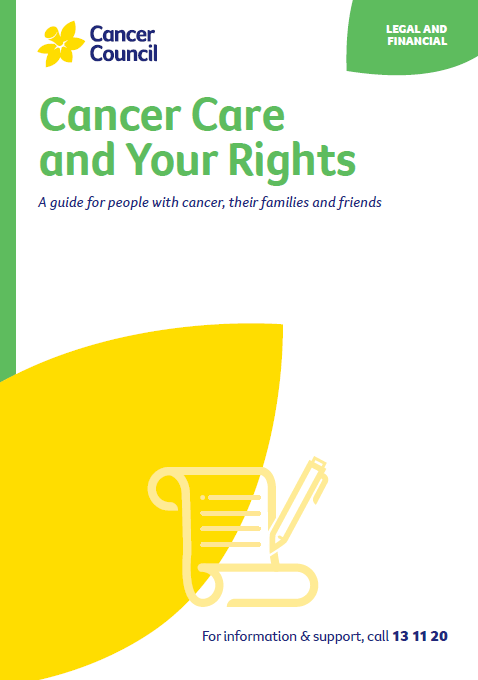- Home
- About Cancer
- Coping with a diagnosis
- Cancer care and your rights
- Health care complaints
Health care complaints
Learn about your rights to provide feedback and make complaints about your health care. Understand how the process works and what to expect.
Learn more about:
- Overview
- Importance of feedback
- How to give feedback or complain
- Steps for resolving a health care issue
- Making a formal health care complaint
- Health complaints organisations
- Regulation of health professionals
- Medical negligence
Overview
You have the right to give feedback or make a complaint about your health care, and to receive a prompt response. This applies whether you are treated in a public or private hospital or treatment centre, or if you see a practitioner in a private clinic. Complaints will be managed differently depending on the type of concern and on the state or territory that you live in.
Health services are also expected to acknowledge patient harm. Patients can expect to be told if something has gone wrong during their care, how it may affect them and what is being done to make care safe. Ask your health service if it has a policy about open disclosure.
Importance of feedback
The safety of the health care system requires the active participation of health professionals, patients and carers. Feedback helps to improve care by supporting what is being done well, highlighting what can be done better, and improving safety.
You can provide feedback in several ways.
| Compliments | Positive comments show health professionals that you value their service and standard of care. |
| Suggestions | General feedback allows minor problems to be dealt with to improve patients’ treatment experience. |
| Complaints | If health professionals and services have not met your expectations, negative feedback can help them improve service gaps or problems in treatment, communication, processes and behaviour. |
→ READ MORE: How to give feedback or complain
Podcast: Coping with a cancer diagnosis
Listen to more of our podcast for people affected by cancer
More resources
Prof Sarah Lewis, Faculty of Medicine and Health, The University of Sydney, NSW; Kevin Bloom, Senior Social Worker, Haematology and Bone Marrow Transplant, Royal North Shore Hospital, NSW; Danielle Curnoe, Consumer; Alana Fitzgibbon, Clinical Nurse Consultant – Gastro-Intestinal Cancers, Cancer Services, Royal Hobart Hospital, TAS; Hall & Wilcox (law firm); Johanna Jordaan, Consumer; Dr Deme Karikios, Medical Oncologist, Nepean Cancer and Wellness Centre, Nepean Hospital, NSW; Melissa Lawrie, Breast Cancer Clinical Nurse, Cancer Services, Gold Coast Hospital and Health Service, QLD; Jacqueline Lesage, Consumer Reviewer, Cancer Voices NSW; McCabe Centre for Law and Cancer, VIC; Louise Pellerade, 13 11 20 Consultant, Cancer Council WA; Andrew Potter, Consumer; Siân Slade, PhD Candidate, Nossal Institute for Global Health and Non-Executive Director (health, disability sectors), VIC; Paula Watt, Clinical Psychologist, WOMEN Centre, WA.
View the Cancer Council NSW editorial policy.
View all publications or call 13 11 20 for free printed copies.

